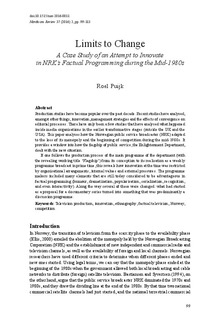Limits to Change : A Case Study of an Attempt to Innovate in NRK’s Factual Programming during the Mid-1980s
Peer reviewed, Journal article
Permanent lenke
http://hdl.handle.net/11250/2421784Utgivelsesdato
2016Metadata
Vis full innførselSamlinger
Originalversjon
10.1515/nor-2016-0011Sammendrag
Production studies have become popular over the past decade. Recent studies have analysed,
amongst other things, innovation, management strategies and the effects of convergence on
editorial processes. There have only been a few studies that have analysed what happened
inside media organisations in the earlier transformative stages (outside the UK and the
USA). This paper analyses how the Norwegian public service broadcaster (NRK) adapted
to the loss of its monopoly and the beginning of competition during the mid-1980s. It
provides a window into how the flagship of public service, the Enlightenment Department,
dealt with the new situation.
If one follows the production process of the main programme of the department (with
the revealing working title ‘Flagship’) from its conception to its realisation as a weekly
programme broadcast in prime time, this reveals how innovation at the time was restricted
by organisational arrangements, internal values and external pressures. The programme
makers included many elements that are still today considered to be advantageous in
factual programming (humour, dramatization, popularisation, serialization, recognition,
and even interactivity). Along the way several of these were changed: what had started
as a proposal for a documentary series turned into something that was predominantly a
discussion programme.

